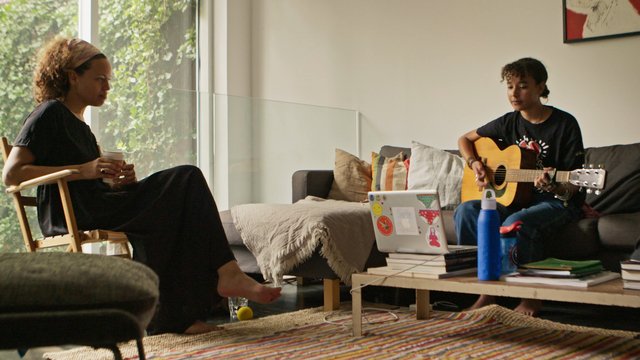On The Record could not be more important. This hard-hitting documentary is a call to bear witness and, above all, a call to change.
Directed and produced by Kirby Dick and Amy Ziering, On The Record follows the heartbreaking and powerful story of music executive Drew Dixon and her decision to become one of the first women of colour to publicly accuse ‘The King of Hip-Hop’ Russell Simmons of sexual assault.
‘I don’t think it’s a coincidence that the majority of women that have come forward in Hollywood have been white women’. Bim Andewunmi’s opening reflection on the #MeToo movement presents the film’s primary concern, that, while the #MeToo movement is undoubtedly a progressive, essential campaign calling time on sexual misconduct within creative industries, it is, like anything, imperfect. The sad reality is that, even amongst victims of great injustice, there exists a racial bias. On The Record provides much-needed insight into the experiences of women of colour who have fallen victim to sexual assault in the music industry, and the barriers modern society places on the path to justice.
As a white woman, I was unsure of my ability to comment on such a sensitive illustration of the struggles of these women, women whose plight I have been fortunate enough to have never experienced, and will, frankly, never understand. However, On The Record changed my mind, it made very clear that what needs to come from stories such as this, is conversation and growth, not silence.
What is striking about this film is the way it addresses the deep rooted ‘race loyalty’ established amongst the black community, the feeling of a shared responsibility amongst black women to protect their attackers from persecution for fear of ‘adding fuel to the fire of the myth of the sexually aggressive black man’. The film sheds light on how white racial prejudice has cultivated a mentality in which black women are expected to ‘take it for the team’, to prioritise the image of their race over seeking justice for the horrendous crimes periodically committed against them. As Kimberlé Crenshaw (author of Intersectionality) states ‘Your responsibility to muffle your screams is greater than their responsibility to not do it in the first place’.

The film illustrates how, for black women in professional settings, such as the music industry, there is a choice to be made between success and safety. Dixon, specifically, suffered professionally, and was denied opportunity when she refused to submit to the sexual advances of Music Mogul L.A Reid when working for his label. Instances such as this are revealed to be commonplace, described within the film by victims to be simply ‘the price of admission’. On The Record makes startlingly clear that this is not a black issue but a societal issue, racial prejudice perpetuated by white society has aided the suffering of black sexual assault victims. Dick and Ziering’s brutally honest documentary provides an education that is so desperately needed.
Racial privilege is a very prevalent theme within the film, and what is interesting is that this subject extends beyond the seemingly binary borders of black and white. Drew Dixon, Sil Lai Abrams and Jenny Lumet, three of the women who publicly accused Russell Simmons of sexual assault, each defined themselves as having ‘Light-privilege’. These women explain that, due to their lighter complexions, they have had a greater platform to seek justice not only for themselves but for those black women whose voices have been silenced. Dixon joked briefly about how she had been the designated ‘cab-catcher’ amongst her black friends when working as a music executive in the 1990’s. Her lighter skin tone meant cabs were more likely to stop for her. In deciding to go on the record and formally accuse her attackers of sexual assault, Dixon is the metaphorical ‘cab-catcher’, once again using her self-defined ‘light privilege’ as a vehicle for progress, ‘for the other black women who are not safe’ (Dixon).
What is most inspiring about the execution of this film is that, though centred around the experience of Drew Dixon, it is very much a collective retelling of the suffering and plunder of many women of colour, both in the music industry and beyond. The film features accounts from many writers, activists and creatives who each add valuable insights into the issues raised.
A brief but incredibly telling section of the film was a conversation between Dixon and her hairdresser Cyndy Small. Small did not have the certain privileges that Dixon had identified as having aided her call for justice. She did not have Dixon’s lighter complexion or her widely recognised success, she represented the women that Dixon was fighting for, those who are statistically more likely to experience abuse and those least equipped to seek justice. Small said that she felt it was important that Dixon told her story, ‘because little girls need it’. Here, Small highlighted the message of On The Record, that without education, and a serious societal shift, the most vulnerable are liable to continue to suffer abuse and injustice. We each have a responsibility to take something from this film, to listen, to believe and to change, for all the little girls.
On The Record is now available to watch on HBO Max.

